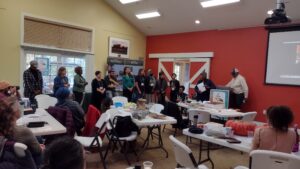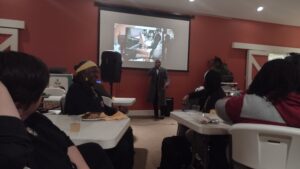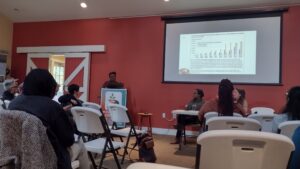Progress report for LNE22-456R
Project Information
Most seeds grown in Northeastern farms and gardens are not sourced regionally. As a result, many seeds are not adapted to regional environmental conditions, and crop production does not often match the cultural acceptability of food among the region’s diverse populations. Although Northeastern seed growers do produce locally adapted seeds, many of which have cultural importance, most of these growers remain disconnected from one another and formal market opportunities, hindering the stewardship of regionally adapted culturally meaningful (CM) seeds. BIPOC growers in particular are crucial stewards of CM seed in the Northeast but often lack access to the necessary resources to enter markets and meet consumer demand.
This project will support the Ujamaa Cooperative Farming Alliance (UCFA), a collective of BIPOC seed growers, to enhance the market viability of regionally adapted CM seed in the Northeast. Based on lessons from the Global South, where value chain development initiatives have successfully linked smallholders growing CM crops to competitive market opportunities, this project adapts the Participatory Market Chain Approach to identify market opportunities for UCFA seed growers and cultivate coordination with other Northeastern seed value chain entities (i.e., seed companies, farmers, gardeners) and those further downstream interested in end products (fruits, vegetables, etc.) originating from CM seeds (specialty grocers, restaurants, wholesalers). Specific objectives are to (a) ascertain the opportunities and barriers to marketing CM seeds, (b) determine UCFA growers’ position to take advantage of market opportunities, (c) assess Northeastern seed consumers and other end-users’ demand for CM seeds to inform marketing strategies, and (d) build capacity of UCFA to take advantage of identified opportunities.
Using a participatory mixed-methods approach, this project is driven by the perspective, priorities, and action of UCFA members who have shown significant interest in selling CM seed through their assemblage of 182 members, of which 81 reside in the Northeast, since 2019. In collaboration with University of Vermont (UVM), UCFA seed growers will lead the research approach and activities of this project. Qualitative data will be collected through UCFA community convenings and focus groups representing critical segments in the Northeastern seed value chain to inform the development of surveys to comprehensively assess various stakeholder perspectives regarding the opportunities for and challenges to marketing CM seed in the region. Research findings will provide the basis for a UCFA marketing and outreach plan, as well as other deliverables useful to producers throughout the Northeast including research briefs, professional and academic conference presentations, and peer-reviewed publications. Additionally, this project will establish a methodology for market development and coordination for regional agricultural initiatives pursuing sustainability and social justice, and more broadly, will serve as a model to expand choice in production, nutrition, and diet.
This project will support the Ujamaa Cooperative Farming Alliance (UCFA), a collective of BIPOC seed growers, to enhance the market viability of Northeastern adapted, culturally meaningful (CM) seed. The specific objectives are to (a) ascertain the opportunities and barriers to marketing CM seeds, (b) determine UCFA growers’ position to leverage market opportunities, (c) assess Northeastern end users’ demand for CM seeds, and (d) build the capacity of UCFA to take advantage of identified opportunities. These objectives support Northeastern BIPOC growers benefitting from an emerging market while enhancing climate resilience, food security, and equity in the regional food system.
Cooperators
- (Researcher)
- (Researcher)
- (Researcher)
- (Researcher)
- (Researcher)
Research
The first phase of this project focused on qualitative data collection through focus groups with different actors in the Northeastern seed value chain. As outlined in the proposal, our goal was to complete six focus groups by November 2022, which was achieved on November 8, 2022. The six focus groups focused on: Ujamaa seed growers (n=4), seed companies (n=6), non-Ujamaa farmers and gardeners (n=3), restaurant chefs (n=8), food distributors (n=4), and specialty grocers (n=4). Each of the focus groups lasted 60-90 minutes and was conducted remotely via Microsoft Teams. The focus groups were recorded and transcribed, and the research team (made up of both UVM and Ujamaa personnel) have now just begun the process of qualitative analysis, which we expect to last through February and will inform the development of surveys that will be deployed in Spring/Summer 2023.
Farmers have been heavily involved in the project activities thus far. In terms of research participants, at least 8 of the participants were growers, and our plan is to include many more producers when survey deployment takes place. On the research side, farmers also consistently engage in important ways. The three Ujamaa members who help lead this project all grow culturally important seeds and the five additional Ujamaa members who are part of the research team are likewise Ujamaa growers. One of those researcher-farmers facilitated all 6 of the focus groups and was accompanied by another Ujamaa team lead (to take notes) and one UVM individual (serving as tech support). We decided to prioritize an Ujamaa member as the focus group facilitator in order to a) ensure that Ujamaa is the face of the project to the degree possible and b) to ensure that the focus group was steered by someone whose lived experiences as a BIPOC grower could identify important leads and conversation strands useful to Ujamaa. To prepare the Ujamaa researchers for focus group facilitation, UVM provided training on focus groups to the Ujamaa research team, which included a power point presentation, additional resources, and exercises for practice.
In Year 2, our attention has been primarily dedicated to the analysis of qualitative data and survey data collection. Qualitative analysis is ongoing and has proceeded with one Ujamaa researcher and one UVM graduate student engaging in regular meetings to refine the coding framework and code the data from the 6 focus groups. This process has proved to be slower than anticipated, given the amount of time that has been required for both researchers to identify, discuss, and integrate the assumptions that each brings to the analytical process. This has led to a more robust and rigorous methodological process, by which important discussions about experiences and identities biasing data interpretation and purpose of data analysis have been had. At this point, three of the focus groups have been fully coded in a way that agreement between the two coders is adequate and the coders are now working their way through the final three transcripts.
Using preliminary insights from the focus groups, UVM and Ujamaa researchers began to develop a survey in February 2023. Beginning in April, the PI and an Ujamaa researcher would meet virtually to construct the survey. This collaborative process mean that progress was slow but that each question - and the organization of them - were considered carefully. During survey development, Ujamaa and UVM researchers were consulted consistently. In July 2023, the survey was field tested by a group of 8 individuals representing various stakeholder groups (seed growers, farmers/gardeners, chefs/restaurants, grocers, seed companies). Upon incorporate feedback, the survey was again field-tested in September 2023 to assess survey functionality in Qualtrics. Recruitment began in early October 2023 by both Ujamaa and UVM. Two main methods were used for recruitment. Key organizational contacts (i.e., NOFAs, Master Gardeners, Black farmer associations, etc.) were contacts to see if they'd be willing to distribute the survey recruitment email in their listservs and/or within newsletters. In addition, a contact list had been compiled through internet research of seed companies, restaurants, wholesalers/food distributors, and grocers and the survey recruitment email was sent directly to them. Focus initially exclusively focused on the Northeast. Early success receiving several hundred responses in the beginning weeks, primarily among farmers and gardeners compelled us to focus more attention to other seed value chain stakeholders (chefs, grocers, etc.) and expand our scope geographically (recognizing that seed networks are not often geographically bound and that a broader geographic focus would illuminate and contextualize the activities within the Northeast to a greater degree).
Survey data collection is ongoing and will not conclude until the end of January. To date, we have received 1,948 survey responses, of which 419 are from the Northeast. It has continued to be a struggle to recruit other seed value chain stakeholders to the levels we had hoped: of the 1,948 responses, 1,093 are from gardeners and another 351 are from farmers
Because we are at the beginning of qualitative analysis, only very preliminary findings exist. However, our methodological approach of a value chain analysis, by which we discuss opportunities and barriers with different actors in the seed value chain, has generated rich and robust data that we are confident will be insightful to issues of value chain development, food justice, and the availability and accessibility of seeds. Perhaps the most interesting thread we are currently pursuing in our analysis is the internal tradeoffs that can exist within food justice initiatives. For example, across multiple focus groups, participants articulated the tension they feel in their commitment to supporting local farms but those farms can't typically provide the culturally meaningful seeds/food they are interested in. Additionally, individuals also grapple with what their role just be in food justice initiatives. For example, despite seed companies playing a key role in seed distribution, several expressed discomfort with having the power to decide what culturally meaningful seeds to market and how, suggesting tensions in how people reconcile their own identities with broader ethical commitments in the food system.
From focus group analysis, several interesting preliminary finds have emerged. First, while white participants often relate to the cultural embeddedness of seeds being tied to regionality, BIPOC participants more commonly articulate culturally meaningful seeds and food as an expression of community. This difference in perspectives is causing us to be more explicit in our coding definitions. In addition, have found that participants think that for cultural meaningful seed to gain a foothold in the market, it will need to be complemented with increased exposure and awareness through things like educational programming and tastings. Seed companies in particular have articulated the need for more education around culture embedded in seeds, as they have indicated that their most common customers do not likely have high familiarity with culturally meaningful seeds. But it's not consumer demand alone that will need focus, as those engaged in production have commonly voiced concern about the financial viability of seed growing, pointing to the need. Strategies need to be identified to make growing CM seeds economically viable and worthwhile for small-scale seed growers in order to meet demand and ensure that seed companies pay growers a fair price for seeds.
Survey data analysis will begin when the survey closes at the end of January.
Education & Outreach Activities and Participation Summary
Educational activities:
Participation Summary:
As part of research activities, UVM personnel developed two trainings for Ujamaa researchers: one on focus groups and how to conduct them (Focus groups Training) and the other on qualitative data analysis (Qual Training_11.18.2022). These slide decks were provided to Ujamaa researchers but were also presented during online meetings.
Additionally, we held two advisory committee meetings (one in August and one in December) and provided online updates to the advisory committee regarding project progress and next steps.
In late October, this project contributed to the two-days Sorghum Festival Ujamaa coordinated and executed. Held in Accoceek, MD, this two-day event attracted ~50 individuals, most of whom were Ujamaa members. The two-day event included several informational sessions on agrobiodiversity, seed saving, seed cleaning, sorghum processing, etc. A brief (~15 minute) update was presented to attendees about the project. Photos of the two-day event may be found here: 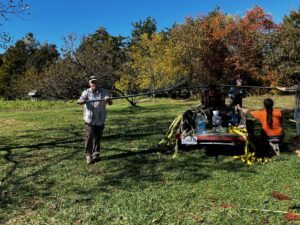
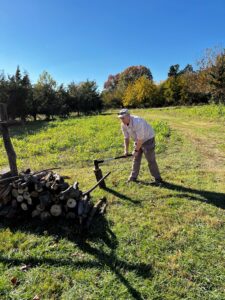
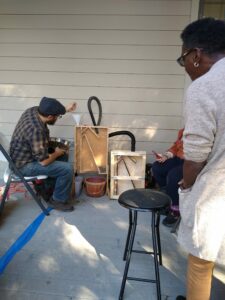
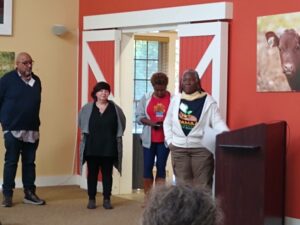
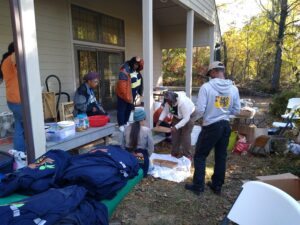
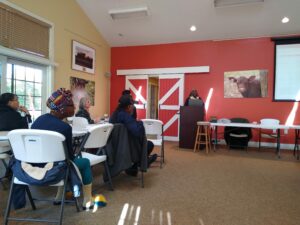
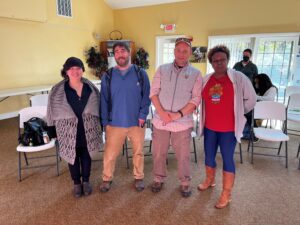
We are currently developing two conference abstracts for submission based on focus group data (target conferences: Agriculture and Human Values in early June and Rural Sociological Society in early August). As we analyze the qualitative data, we will also be identifying opportunities to develop outreach materials like one-page bulletins to ensure that the findings are disseminated to many audiences beyond just academics.
In Year 2, UVM personnel attended two workshop events with Ujamaa and partners: one in Kentucky and one in October (again the Sorghum Festival). At both meetings, visioning exercises, analysis of organizational progress, and discussion about this project and the research that will emerge will discussed. These convenings were attended by Ujamaa growers, federal agency representatives, seed companies, non-profits, Extension educators, and university researchers. Below are a few pictures from the Sorghum Festival in Accoceek, MD.
In addition, our team presented two collaborative conference presentations, one at the Agriculture, Food, and Human Values Society (AFHVS) conference in June in Boston, MA, and the other at the Rural Sociological Society (RSS) conference in August in Burlington, VT. The AFHVS presentation included a collaborative presentation, by which two Ujamaa researchers and two UVM representatives co-presented. At RSS, a UVM graduate student presented, with embedded video from Ujamaa researchers. Slide decks for the two presentation are included under Informational Products.
In June 2023, the three primary grant partners from Ujamaa and one Ujamaa researcher traveled to Vermont where they expanded their networks. Their meetings included UVM administrative leaders (CALS Dean, Associate Dean, and Director of the Food Systems Research Center), New Farms for New Americans program staff in the Association for African Living in Vermont, High Mowing Organic Seeds, and seed growers engaged in the Upper Valley Seed Savers.
We also continued to utilize our advisory board. We asked each advisory board member for their critical review of our survey and convened the board in November to request assistance with survey recruitment and field other suggestions.
Learning Outcomes
Our trainings for Ujamaa leaders and researchers are the activities that have most obviously affected knowledge, attitudes, skills, and/or awareness. Although no formal data collection has been conducted to assess gains, informal comments from Ujamaa partners have suggested that they have learned about the research process, qualitative analysis, budget management, and university collaborations, among other topics. Designed as a project that builds the capacity of Ujamaa to conduct applied research projects, the success that Ujamaa collaborators have had in successfully facilitating focus groups and engaging in the qualitative analysis process points to considerable increases in knowledge and skills.
In Year 2, training continued to be intensive for Ujamaa members. In particular, one of the Ujamaa researchers has gained extensive experience and skills in qualitative data analysis through her serving as one of the two primary coders. In addition, one Ujamaa researcher has gained survey development skills through her consistent engagement int he process of survey construction. All Ujamaa researchers have learned about and participated in the survey recruitment process, including considerations of IRB process and stipulations.
Project Outcomes
This project was designed as a highly collaborative, participatory one. To that end, we have structured its management in such a way that demands time and energy. The leadership teams at Ujamaa and UVM meet every other week, meetings among UVM personnel occur every other weeks, and ad hoc meetings are scheduled as necessary with Ujamaa researchers to prepare and/or navigate current research activities. This approach is time consuming and doesn't allow for rapid decision-making, but has been effective in developing trust and rapport and allowing space for disagreements to be worked through. To date, Ujamaa and UVM are working together in a highly functional, productive way that provides the project momentum as we prepare for the second phase of research (surveys).
This project continues to be time-intensive, but that investment continues to yield promising results. Through consistent engagement from both Ujamaa and UVM, a high degree of trust has been developed, fostering an environment to engage in critical discussion, always with an eye towards enhancing the quality of the project and supporting Ujamaa.
Information Products
- Focus Group Training (Manual/Guide)
- Qualitative Analysis Training (Manual/Guide)
- Culturally meaningful seed: Navigating the complexities around accessibility, sustainability, and marketability in seed value chains in the Northeastern United States (Conference/Presentation Material)
- Market niches for culturally meaningful seed in the Northeastern US: A seed value chain analysis to encourage accessibility (Conference/Presentation Material)
